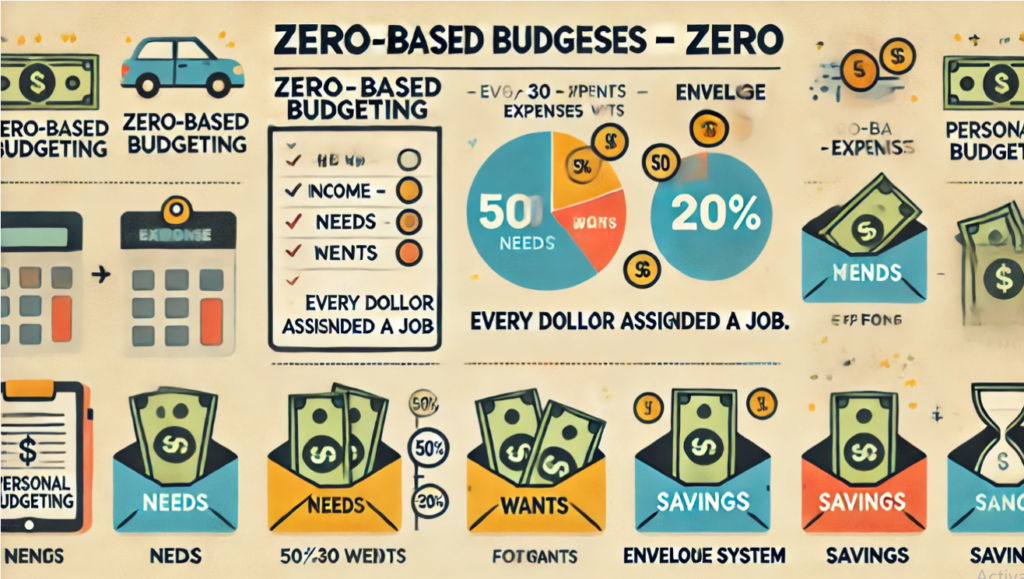Budgeting is an essential tool for achieving financial freedom and stability. By creating a budget, individuals can track their income and expenses, prioritize their spending, and work towards their financial goals. In this article, we will delve into the importance of budgeting, its connection to financial freedom, and provide practical tips for creating and sticking to a budget. Whether you are looking to pay off debt, save for a big purchase, or build wealth, budgeting is a crucial step in taking control of your finances.
Understanding the Basics of Budgeting
What is a budget?
A budget is a financial plan that outlines an individual or organization’s income and expenses over a specific period of time. It serves as a roadmap for managing and allocating funds to meet financial goals and obligations. Key components of a budget include:
Income: The amount of money coming in, including wages, investments, and other sources.
Expenses: The costs of goods and services, such as rent, utilities, groceries, and entertainment.
Savings: Funds set aside for future goals, emergencies, and retirement.
Debt: Payments for loans, credit cards, and other liabilities.
Budget categories: The specific areas where money will be allocated, such as housing, transportation, and entertainment.
Why budgeting is crucial for financial freedom
Budgeting is crucial for financial freedom because it helps track income and expenses, preventing overspending and enabling long-term savings and investments. By creating a budget, individuals can have a clear understanding of their financial situation and make informed decisions about their spending and saving habits. This can ultimately lead to greater financial stability and the ability to achieve long-term goals, such as buying a home or retiring comfortably. Without a budget, it can be difficult to control spending and prioritize saving, making it harder to achieve financial freedom.
Assessing Your Current Financial Situation

When determining your monthly take-home pay, it’s important to factor in deductions such as taxes, retirement contributions, and health insurance premiums. This will give you a clear understanding of the amount of money you have available to cover your expenses. Tracking your expenses is crucial for understanding where your money is going. By categorizing your expenses into fixed (such as rent or mortgage payments) and variable (such as groceries or entertainment), you can gain insight into your spending habits and identify areas where you can potentially cut back. It’s also important to differentiate between necessary expenses, such as food and utilities, and discretionary expenses, such as dining out or shopping. This can help you prioritize and make informed decisions about where to allocate your funds.
Setting Clear Financial Goals

Setting clear financial goals is essential for creating a roadmap to financial success. Short-term goals such as paying off debt and saving for an emergency fund can provide a sense of financial security and stability. Medium-term goals, like saving for a vacation, buying a car, or making home improvements, can help you work towards larger purchases and experiences. Long-term goals, such as retirement planning, building wealth, and funding education, are crucial for securing your financial future. By setting clear and achievable financial goals, you can take control of your finances and work towards a more secure and prosperous future.
Choosing the Right Budgeting Method

Zero-based budgeting is a method where you allocate every dollar of your income towards a specific purpose, such as expenses, savings, or debt repayment. This means you start from zero and build your budget from scratch, ensuring that every dollar has a job. The main benefit of zero-based budgeting is that it forces you to prioritize your spending and helps you track your expenses more effectively. However, it can be time-consuming and requires careful planning. The 50/30/20 rule is a budgeting method that suggests allocating 50% of your income towards needs, 30% towards wants, and 20% towards savings and debt repayment.
Creating Your Budget Plan
Creating a budget plan is an important step in managing your finances. To begin, start by listing all of your sources of income. This can include your salary, investments, and any other sources of money coming in. Next, categorize and list all of your expenses. This can include housing, transportation, food, and entertainment. It’s important to have a clear understanding of where your money is going. Once you have a clear picture of your income and expenses, prioritize savings and debt payments. It’s important to set aside money for emergencies and future expenses, as well as paying off any debt you may have. Finally, adjust your budget to align with your financial goals.
Cutting Expenses and Finding Savings

When looking to cut expenses and find savings, it’s important to first identify areas where you can reduce spending. This may include cutting back on eating out, entertainment expenses, canceling unnecessary subscriptions, and finding ways to lower your utility bills. In addition to cutting discretionary spending, you can also work on reducing fixed expenses. This can be done by refinancing high-interest debt, switching to a more affordable insurance provider, and negotiating bills such as cable, internet, and phone services. To save more money, consider using practical strategies such as using coupons for groceries and other purchases, buying in bulk to take advantage of lower unit prices, and reducing impulse purchases by sticking to a budget.
Managing Debt While Budgeting

When it comes to managing debt while budgeting, it’s important to understand the difference between good debt and bad debt. Good debt typically refers to loans that are used to invest in something that will appreciate in value, such as a mortgage or student loans. Bad debt, on the other hand, usually refers to high-interest consumer debt, like credit card debt. When approaching different types of debt, it’s important to prioritize and make a plan for paying it off. For example, with mortgage and student loans, it may be more beneficial to focus on making regular payments and potentially taking advantage of any forgiveness or income-driven repayment programs.
Tracking Your Progress and Adjusting Your Budget
Tracking your progress and adjusting your budget is an important part of managing your finances. Regularly reviewing and updating your budget allows you to track your spending and savings, and adjust for unexpected expenses. Setting up periodic financial check-ins, such as monthly, quarterly, and yearly reviews, can help you stay on top of your financial goals. It’s also important to stay motivated and accountable by setting realistic goals and regularly checking in on your progress. By doing so, you can ensure that your budget reflects your current financial situation and helps you work towards your financial objectives.
Preparing for the Unexpected: Emergency Fund and Insurance
It’s important to have an emergency fund in case unexpected expenses arise, such as medical bills or car repairs. Financial experts recommend saving at least three to six months’ worth of living expenses in your emergency fund. This can provide a safety net in times of need and help prevent financial hardship. When it comes to insurance, it’s crucial to have coverage for various aspects of your life, including health, auto, life, and disability. Health insurance can help cover medical expenses, while auto insurance can protect you in case of a car accident. Life insurance can provide financial security for your loved ones, and disability insurance can help replace lost income if you’re unable to work due to injury or illness.
The Role of Investments in Financial Freedom

Why investing is important for financial freedom
Investing is important for financial freedom because it allows your money to grow over time. While saving money is important for short-term goals and emergency funds, investing can help you build wealth and achieve long-term financial security. When you invest, your money has the potential to earn a higher return than it would in a traditional savings account, which can help you reach your financial goals more quickly. Additionally, investing allows you to take advantage of compounding interest, which can significantly increase the value of your investments over time. By carefully allocating your money into different investment vehicles, you can diversify your portfolio and reduce risk, ultimately working towards achieving financial freedom.
Basic investment strategies
Stocks, bonds, mutual funds, and real estate are all different types of investments that people can consider when building their portfolio. Each type of investment comes with its own set of risks and potential rewards, so it’s important for individuals to carefully research and consider their options before making any decisions. It’s also wise to consult with a financial advisor to help determine the best investment strategy based on your individual financial goals and risk tolerance.
Conclusion
In conclusion, creating a successful budget plan involves several key steps including identifying your income and expenses, setting financial goals, tracking your spending, and making adjustments as needed. Maintaining a budget can lead to long-term benefits such as improved financial stability, reduced stress, and the ability to save for future goals. I encourage you to take action and begin the budgeting process today to take control of your finances and work towards a more secure financial future.














